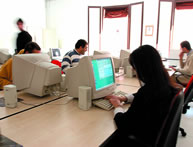Promoting Social Inclusion
with
Supporting Policies
by Alberto Borghi, picture by Ramiro Castro Xiques
Duccio Campagnoli, Councillor
to Productive Activities in the Emilia-Romagna Region presents
intervention plans in support of the differently
abled.
R. In general, the role
of the Region is to put in place supporting policies and to create
incentive for productive activities. From this point of view, the various
interventions intend to provide support to the needs of the different
productive sectors even to different types of businesses. If they own a
business whether it is small, mid-size or whether they are self-employed,
people who are differently abled can find opportunities to support their
activity in different measures: among the different measures of the
three-year regional plan for productive activities, according to L.R.
20/94, or by accessing Artigiancassa funds.
In particular, the Region
promotes through such tools, the adoption of computer and telephone
technologies for central management, production management,
commercialization, as well as research and planning activities. Such
technologies are characterized to reduce significantly the barriers that
may exist for the differently abled who are involved in working
activities. With these tools, there is even support for investments in
safety and quality of the work organization, while there are specific
interventions for the promotion of full quality and the adoption of
systems for social responsabilities.
Specifically, within the framework
of Docup OB2 and the limits of certain areas of the regional territory,
two notices have been put into place in Measure 1.4 action C) concerning
specifically social organizations and contributions for "promoting social
inclusion of persons in situations of discomfort and those in conditions
of disadvantage in respect to the work market."
An ulterior
intervention plan is to create awareness within the Provinces responsible
for the management of support interventions of small-scale businesses and
to recognize as priorities those business projects, matching those
proposed by the law, and which involve persons who are differently
abled.
D. In this context, what does this mean for the growing workplace automation?
R. The experience in the management of Measure 1.4 action C) of Docup OB2 has demonstrated how, in the context of support to productive activities, the growing workplace automation has offered new opportunities not only for work, but also for the creation of businesses by differently abled people. So the workplace automation is intended to play an increasingly considerable role as a key to accessing work, whether is is independently or within an organization, in productive sectors, or services to businesses or people. Based on innovative economy and knowledge, regional policies encourage the development of the information society through the Telematic Regional Plan and the development of research activities to reinforce the immaterial economy of knowledge, more and more necessary to make the whole economic system competitive. In an economy based on knowledge, a community based on knowledge is asserted, and no doubt is capable to overcome many of the traditional barriers for persons who are differently abled.
D. What prerogatives can the regional legislator be proud of compared to what exists on the regional level in terms of protection of the differently abled?
R. The regional legislator has a better knowledge of the needs of the area, thanks also to the programming of activities which involve the various territorial agencies in order to specifically define productive activities, supporting policies developed according to the various people including those who are differently abled.



